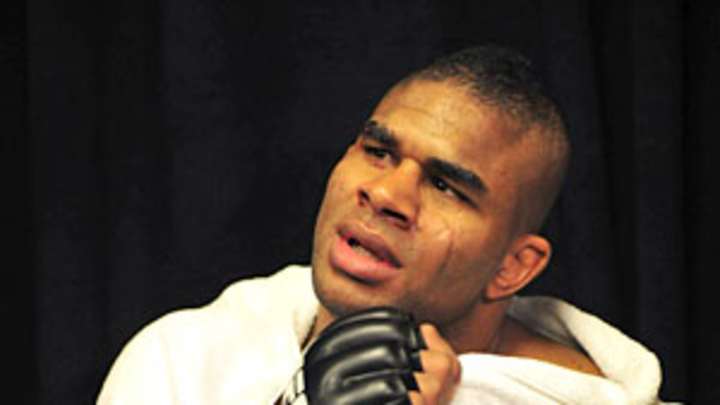Alistair Overeem license request denied at Nevada athletic commission hearing

Alistair Overeem's license application was denied Tuesday in a meeting of the Nevada State Athletic Commission. (Kari Hubert/Zuffa LLC)
UFC heavyweight contender Alistair Overeem’s license application was denied by the Nevada State Athletic Commission on Tuesday in Las Vegas, but the fighter will have the opportunity to re-apply again after Dec. 27, nine months from the date he submitted to a random drug test that revealed elevated testosterone in his system.
Overeem, who’d been removed from a headlining bout against champion Junior dos Santos at UFC 146 on May 26 in Las Vegas by the event’s promoters last Friday, also denied allegations that he had fled the scene once the March 27 random drug testing had been announced following a UFC press conference. Overeem said he hadn’t been told of the testing until he was en route to his lawyer’s office and returned for the test after he was notified.
After nearly three hours of testimony, the NSAC voted 4-0 to shorten the standard one-year waiting period for licensee denials, noting that Overeem and his legal team had presented a “superlative” explanation as to why Overeem’s testosterone-to-epitestosterone ratio had come back at 14:1 -- more than two times higher than the state’s allowable 6:1 threshold.
David Chesnoff, Overeem’s Las Vegas-based attorney, initially asked for a 45- to 60-day continuance to fortify his client’s case, but the NSAC unanimously denied the request.
Attorney Chesnoff told commissioners that the 31-year-old Dutch fighter’s T:E ratio had been heightened after he’d taken two anti-inflammatory shots provided to him by Dallas physician Dr. Hector Molina in January 2012. Dr. Molina had previously examined the fighter during Overeem’s application process with the Texas Dept. of Licensing and Regulation for a bout against Fabricio Werdum at Strikeforce in June 2011.
Chesnoff’s presentation focused on establishing a timeline to show that Overeem hadn’t taken the medication in the vicinity of a competitive bout and that he never intended it to give him a performance-enhancing edge.
Under oath, Overeem said he’d sought out the physician on another fighter’s recommendation primarily for a re-aggravated rib injury while on the road for a promotional tour and was given a mixed shot for the pain on Jan. 12 in Molina’s office that was ultimately revealed to contain a steroid-based component.
Overeem said he’d also self-injected a second shot from the same vial, given to him by Dr. Molina, on March 23 in Las Vegas under the physician’s direction -- four days before the NSAC conducted its random tests. When asked, Overeem told the commission that he hadn’t asked Dr. Molina what was in the medication and the physician had never specified the shot contained steroid-based elements.
However, in separate testimony, Dr. Molina said he’d used the trade name for an aqueous testosterone in the mixture, when describing the medication to the athlete. In later testimony, Dr. Molina admitted he wasn’t sure what names he’d used in describing the drug cocktail he gave the fighter.
Throughout the testimony, both Overeem and his attorneys stated that the fighter had withdrawn from the UFC heavyweight title bout voluntarily, something that hasn’t been confirmed by the promotion to date. Overeem said he’d withdrawn from the bout to clear his name.
-- Loretta Hunt
